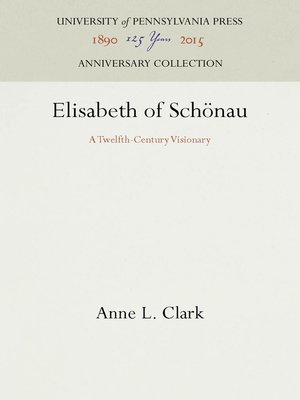
Sign up to save your library
With an OverDrive account, you can save your favorite libraries for at-a-glance information about availability. Find out more about OverDrive accounts.
Find this title in Libby, the library reading app by OverDrive.



Search for a digital library with this title
Title found at these libraries:
| Library Name | Distance |
|---|---|
| Loading... |
Throughout her adult life, the twelfth-century Benedictine nun Elisabeth of Schönau claimed to receive divine revelation through a series of ecstatic visionary experiences. Her reflections on these experiences were recorded and provide both a rich source of understanding of the religious life of a medieval woman and an important perspective on the religious and political ferment of mid-twelfth-century Germany.
Anne L. Clark has written the first comprehensive study of Elisabeth of Schönau. In it, she points out that Elisabeth did not transcribe her own revelations, but rather dictated them to the other nuns of the convent and to her brother Ekbert. Clark takes on the problem of Elisabeth's literacy and examines the nature and extent of Elisabeth and Ekbert's collaboration. In addition, Clark offers a new interpretation of Elisabeth's relationship with Hildegard of Bingen, her celebrated—and more studied—contemporary. Clark contends that Elisabeth was not a timid emulator of a brilliant mentor; instead, she had her own spiritual perspective and her own means of expressing it. In this way, Clark firmly establishes the originality of Elisabeth's visionary accounts.
In the course of the book, Clark highlights the social dynamics revealed in these religious meditations, particularly Elisabeth's place in a world in which women were subordinated to male authority and lay people were subordinated to the religious authority of the clergy.
Elisabeth of Schönau is an informative and groundbreaking work. It will be of particular interest to scholars and students of medieval religion and mysticism, as well as women's studies.







